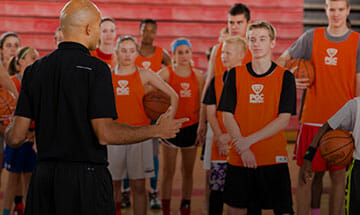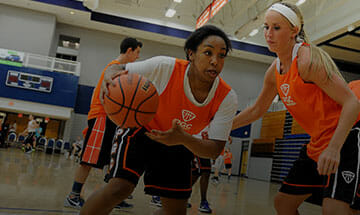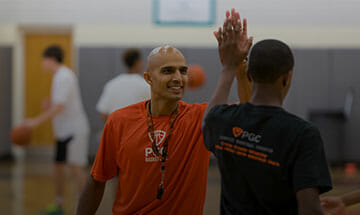Are You Neglecting to Practice this Essential Basketball Skill?
Are you neglecting to practice this essential basketball skill?
If you aren’t trying to improve your communication skills and trying to have more of an impact on the atmosphere you are playing in, you are neglecting a big part of sport.
Good, intelligent communication is important in just about everything, not just sports. This is a very broad and important subject about which many books have been written, but I am going to touch on just a few ideas for you to consider. The essential point to understand is that it is necessary to make a constant effort to improve your communication.
- Teammates need encouragement and help.
- Coaches need reinforcement and help.
You can add much to your sports experience by being tuned in to your teammates and coaches and by knowing how to respond, what to say, how to say it. And communication skills, like sports skills, submit to practice. The more you practice them, the better they get.
If you are one of those athletes who just shuts up and plays, and claims you’re not into a bunch of talk, think again. No one is demanding that you be into a bunch of talk. But you should be aware of how valuable communication is.
- The star has a concern.
- The star in a slump has another.
- The former star on the bench has another.
- The reserves always have a special set of feelings and concerns.
If you are oblivious to your teammates’ issues or make no attempt to respond to any of them, you will soon be labeled a selfish player and you will be part of the problem yourself.
This does not mean you have to take each teammate by the hand and sympathize with every fragile feeling. It just means you have to be aware of what’s going on around you and be willing to respond and communicate feelings and ideas. If you do this, your team will win more often. If you fail to do it, you will lose more often. It’s that simple.
The complexity of human communication is what gives Homo sapiens special opportunities, enables us to be inspired, and lets us work together to accomplish a goal. If you aren’t trying to improve your communication skills and aren’t trying to have more of an impact on the atmosphere you are playing in, you are neglecting a big part of sport.
Watch More: How to Communicate with Teammates
Talk to your teammates and coaches. Learn not only to say what you think and to express your thoughts clearly, but also to listen to your teammates and coaches and to understand what they are trying to express. This effort will serve you well off the field later in life, for your whole life. You can never be too good a communicator, and sports participation offers many excellent opportunities to use communication skills in order to improve performance. Let me give just one example.
Every practice or training session has tired, bored, unhappy, unfocused, and uninspired athletes…to varying degrees. To what extent can you turn them, your teammates, into energized, tuned-in, happy, focused, and excited athletes? Surely you realize that athletes who practice diligently will improve more and play better in games.
So, how do you help make that happen? You communicate. You encourage. You notice things and respond. You pick up your teammates constantly with whatever kinds of encouragement and urgings are most likely to work on them. If you keep to yourself and remain quiet, you’re fooling yourself.
You are failing to do things that could, and constantly do, make a big difference in the results of future games. Your communication in games, of course, matters too. But never so much as it does during the preparation for those games.
Finally, let me close this section with a question that raises an entirely different issue. How well do you communicate with yourself? What do you tell yourself when you confront an obstacle, when things don’t go the way you hoped, when people do things that initially disappoint you? How good are you at communicating with yourself, at getting yourself to respond intelligently and reasonably to whatever happens to you?
Are you accustomed to telling yourself, “I can handle this, this is just another obstacle to be overcome, no sweat, no big deal, I’ll take care of it”? Communicating intelligently and inspiringly with yourself is even more important than communicating intelligently and inspiringly with your teammates. You’re unlikely to be able to reach them if you can’t reach yourself.
Remember, practice makes perfect. You have to practice communicating intelligently with yourself, and with others, if you want to be good at it. And you certainly ought to want to be good at it. Good communication is an essential ingredient of championship performance.
Do you need some actual evidence to get you started? Before practice, talk with your teammates about specific tactics or skills to help them get focused and to get them to want to work hard. In the training room or at the start of practice use humor to get players’ minds off sore feet or nagging injuries.
Encourage them throughout a practice. Use specific names, compliment. Point out good things during and after practice to the team and to individuals. Notice things and comment on them. Everything will make a difference. Go for it!
—Excerpted from the book, “Think Like a Champion”
Related Articles
5 Ways to Practice Mental Toughness
Here are five ways to practice your mental toughness off the court. If you practice these five things, every day, you’ll develop greater self-discipline. You’ll become unstoppable in anything you do. It is five things you will have to rise above your feelings every day. That is how you build mental toughness. You develop, as a habit, a muscle of rising above your feelings to level of your aspirations and commitments.
Why Is My Performance Inconsistent?
Do you ever feel like your performance in games is consistently inconsistent? That you’re putting in the same hard work at practice every day, yet some days you play really well and others you don’t play well at all? If that’s you, you’re not alone. If that’s not you, don’t worry—the frustration is coming soon!
Quit Being So Hard to Coach
COACHES HAVE FAVORITES!! Of course, they have favorites—their favorites are the players they can trust, on and off the court.
Here are four reasons you may not be getting the playing time you think you deserve.
About PGC
PGC Basketball provides intense, no-nonsense basketball training for players and coaches. Our basketball camps are designed to teach players of all positions to play smart basketball, be coaches on the court, and be leaders in practices, games and in everyday life.
We combine our unique PGC culture with a variety of teaching methods and learning environments to maximize the learning potential of those that attend our sessions. In addition to spending 6-7 hours on the court each day, lessons will be reinforced through classroom sessions and video analysis.
Our goal at PGC is to empower you with the tools to fulfill your basketball dreams, while also assisting you in experiencing the joy of the journey.
To learn more about PGC Basketball, including additional basketball training tips and videos, visit our YouTube Channel or find us on Facebook, Instagram, and Twitter.













Share This Post